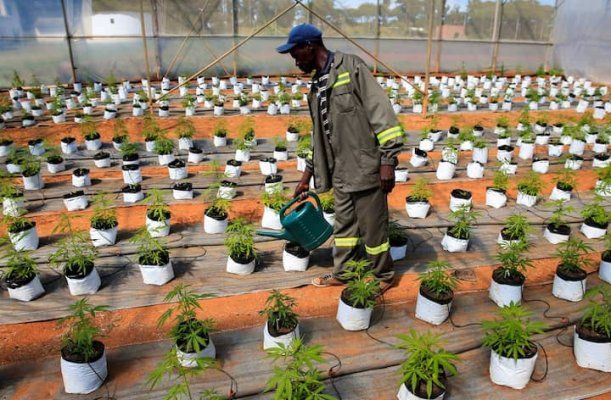Over 40 tonnes of industrial hemp were produced last year, with about five tonnes exported to Switzerland.
In 2020, there were 21 players registered with the Agricultural Marketing Authority (AMA) in the nascent sub-sector.
Through the promulgation of Statutory Instrument 218 of the 2020 Agricultural Marketing Authority (Industrial Hemp) Regulations, industrial hemp production and marketing were legalized.
It is estimated that 50 hectares will be planted with the crop this year, up from 24 hectares last year.
The AMA's chief executive officer, Clever Isaya, said: "Industrial hemp farming is generating a lot of interest."
During 2020-2021, there were 21 registered players, including 13 cultivators, seven merchants, and one breeder.
Currently, there are 60 players, 27 cultivators, 18 merchants, and 15 breeders/researchers."
Two companies are currently producing hemp oil from the local crop - African Medical Cannabis Biotech and Swiss Bioceuticals.
However, the sub-sector is experiencing teething problems, including the lack of local hemp varieties, international testing centers, and a guaranteed local market.
The Swiss market for locally produced industrial hemp fetches about US$10 per kilogramme, said Mr Isaya, adding that research and breeding of local hemp seed varieties are required to increase production.
According to him, local hemp testing centres, investment in research and development, processing of hemp products (hemp grains and hemp fibres), and participation at international cannabis expos are also necessary.
A proposed amendment to Section 155 of the Criminal Law (Codification and Reform Act) has been gazetted by the Government to remove industrial hemp from the list of dangerous drugs.
Dr Kumbirai Mateva, plant breeder at the Tobacco Research Board (TRB), said this would increase production.
"The legal framework is moving toward a more liberal direction," he said.
As part of the Criminal Law (Codification and Reform) Amendment Bill, 2022, industrial hemp is proposed to be removed from the list of dangerous drugs under Section 155 of the Criminal Law (Codification and Reform) Act.
The bill also introduces a legal definition of industrial hemp, which is defined as a plant, Cannabis sativa L, as well as its seeds and derivatives, extracts, cannabinoids, isomers, acids, salts, and salts of isomers, growing or not, with a delta-9-tetrahydrocannabinol concentration of not more than 1 percent dry weight."
He said most people confuse industrial hemp with marijuana, a psychoactive substance.
In comparison to industrial hemp, which contains 0,3 percent THC, marijuana contains about 30 percent tetrahydrocannabinol (THC), a psychoactive component of cannabis.
He said hemp is not intoxicating.
The TRB also proposes raising the legal THC content of industrial hemp to 1 percent for effective medicinal use.
Increasing THC gives industrial hemp farmers more options when selecting genetics to cultivate and allows them to produce for a broader range of markets (between 0 and 1%).
According to Dr Mateva, studies have shown that certain genetics that combine CBD and THC produce fiber qualities and an entourage effect with synergistic therapeutic benefits.
In Zimbabwe, a permit to cultivate industrial hemp costs US$200. Other hemp-producing countries such as Australia, Ecuador, Malawi, Switzerland and Uruguay have raised their legal THC content from 0.3% to 1%.
In 2020, there were 21 players registered with the Agricultural Marketing Authority (AMA) in the nascent sub-sector.
Through the promulgation of Statutory Instrument 218 of the 2020 Agricultural Marketing Authority (Industrial Hemp) Regulations, industrial hemp production and marketing were legalized.
It is estimated that 50 hectares will be planted with the crop this year, up from 24 hectares last year.
The AMA's chief executive officer, Clever Isaya, said: "Industrial hemp farming is generating a lot of interest."
During 2020-2021, there were 21 registered players, including 13 cultivators, seven merchants, and one breeder.
Currently, there are 60 players, 27 cultivators, 18 merchants, and 15 breeders/researchers."
Two companies are currently producing hemp oil from the local crop - African Medical Cannabis Biotech and Swiss Bioceuticals.
However, the sub-sector is experiencing teething problems, including the lack of local hemp varieties, international testing centers, and a guaranteed local market.
The Swiss market for locally produced industrial hemp fetches about US$10 per kilogramme, said Mr Isaya, adding that research and breeding of local hemp seed varieties are required to increase production.
According to him, local hemp testing centres, investment in research and development, processing of hemp products (hemp grains and hemp fibres), and participation at international cannabis expos are also necessary.
A proposed amendment to Section 155 of the Criminal Law (Codification and Reform Act) has been gazetted by the Government to remove industrial hemp from the list of dangerous drugs.
Dr Kumbirai Mateva, plant breeder at the Tobacco Research Board (TRB), said this would increase production.
"The legal framework is moving toward a more liberal direction," he said.
As part of the Criminal Law (Codification and Reform) Amendment Bill, 2022, industrial hemp is proposed to be removed from the list of dangerous drugs under Section 155 of the Criminal Law (Codification and Reform) Act.
The bill also introduces a legal definition of industrial hemp, which is defined as a plant, Cannabis sativa L, as well as its seeds and derivatives, extracts, cannabinoids, isomers, acids, salts, and salts of isomers, growing or not, with a delta-9-tetrahydrocannabinol concentration of not more than 1 percent dry weight."
He said most people confuse industrial hemp with marijuana, a psychoactive substance.
In comparison to industrial hemp, which contains 0,3 percent THC, marijuana contains about 30 percent tetrahydrocannabinol (THC), a psychoactive component of cannabis.
He said hemp is not intoxicating.
The TRB also proposes raising the legal THC content of industrial hemp to 1 percent for effective medicinal use.
Increasing THC gives industrial hemp farmers more options when selecting genetics to cultivate and allows them to produce for a broader range of markets (between 0 and 1%).
According to Dr Mateva, studies have shown that certain genetics that combine CBD and THC produce fiber qualities and an entourage effect with synergistic therapeutic benefits.
In Zimbabwe, a permit to cultivate industrial hemp costs US$200. Other hemp-producing countries such as Australia, Ecuador, Malawi, Switzerland and Uruguay have raised their legal THC content from 0.3% to 1%.




